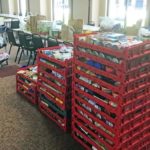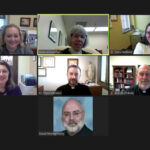For many of us, the shortage of eggs because of avian influenza or “bird flu” creates an inconvenience: higher prices at the supermarket and restaurants for some time to come. For egg producers, the enormous loss of egg-laying hens may be emotional as well as financial, although the government may reimburse some of them for birds that have to be euthanized as a precaution.
Not so readily apparent is the collateral damage: farm workers who no longer have jobs; farmers who depended on egg producers to purchase corn for feed; low-income individuals whose access to an affordable, rich source of protein is jeopardized. In addition, bakers worry about not having the egg products they need for fresh and packaged baked goods and exhibitors won’t be allowed to show any birds at county fairs in Iowa and the state fair this year. For some 4-H youths, that means the potential loss of college-fund money they could have won showing chickens they’ve nurtured for months.
Iowa is the largest egg-producing state in the nation, producing 15 billion eggs a year — one of every five eggs in the U.S. So when the H5N2 strain of bird flu struck earlier this spring in western Iowa (and other Midwestern states) state and federal agriculture officials were alarmed. The disease likely spreads through the droppings of migratory birds, but scientists and agricultural experts don’t know exactly how bird flu got introduced to poultry flocks. Total mortality for a flock is about 90 percent, depending on various conditions, says Gary Kaasa, a certified blood tester for the state of Iowa. That’s why entire flocks have to be destroyed, once the infection has been detected. Health officials say the identified strain of bird flu is not a threat to human health.
Although the bird flu hasn’t migrated to southeastern Iowa, Gov. Terry Branstad on May 1 declared a state of emergency in Iowa, the third state in the Midwest to do so, because of the bird flu outbreak, according to the Iowa Poultry Association. Branstad’s order puts into effect restrictions to enforce preventative measures, testing and monitoring in areas impacted by bird flu. These restrictions have a ripple effect.
“Avian flu has come close enough to Des Moines so (the state veterinarian) has banned poultry shows through the state. Every fair in the state is banning anything with feathers,” says Kaasa, who also is a Davenport firefighter. He and his wife Denise raise a flock of about 300 chickens on their farm near Eldridge, largely for educational purposes. He won’t be able to incubate poultry at the county fairs he typically participates in. That’s never happened in the eight years of the education project.
People living off the farm don’t realize it takes about a year for a chick to grow and produce eggs. The egg shortage isn’t going to be resolved soon because many farms have lost their entire flocks, Kaasa says. Although the Netherlands will import eggs to the U.S. during this crisis, the increased cost will especially create a hardship for people on limited incomes. We don’t even stop to think about how many products use eggs, everything from mayonnaise to lotions and shampoos.
“We should take this as an eye-opener for the whole community,” Kaasa says. We wholeheartedly agree. Now that our eyes have been opened, we encourage readers, as people of prayer, to pray for consistent warm weather conditions that kill the virus and for patience for farmers and others whose livelihoods have been disrupted. Embrace the “Circle of Protection” that the U.S. bishops and other faith leaders have created amongst themselves. The circle aims to protect domestic social service programs and international aid. Many workers idled by the bird flu crisis may need to or are already accessing such programs as Medicaid, food stamps, unemployment and mental health services. Contact members of Congress to ensure that the federal budget makes room for these vital programs. Finally, encourage and advocate for more sustainable agricultural practices. We think that’s the approach Pope Francis would take.
Barb Arland-Fye











